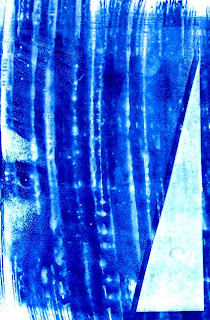"...artwork tells a story which is our theology in motion."
Molly Franzone
"We Christians do not want more time;
we want eternity."
Anthony Esolen
Senior Editor, Touchstone Magazine
This post is about an issue
every artist wrestles with- the process of making things. It is in the process of making art that an artist learns the discipline of the craft; an artist learns to pay attention to detail, to order, to excellence, and to time. Certain processes require time that will not be rushed. For a beautiful message on 'Lessons Learned in the Studio', by Ed Knippers, click here.
And now, three processes Trinity students are in the throes of-
Vine Sculpture
Cyanotype
Serigraphy

Molly Franzone
"We Christians do not want more time;
we want eternity."
Anthony Esolen
Senior Editor, Touchstone Magazine
This post is about an issue
every artist wrestles with- the process of making things. It is in the process of making art that an artist learns the discipline of the craft; an artist learns to pay attention to detail, to order, to excellence, and to time. Certain processes require time that will not be rushed. For a beautiful message on 'Lessons Learned in the Studio', by Ed Knippers, click here.
And now, three processes Trinity students are in the throes of-
Vine Sculpture
Cyanotype
Serigraphy
A good find
Here are a few pieces the students fashioned from vines found in the wood behind our home:
Emma Carter
Will Levings
Sam Carter
Mechal Harward
Davis Martinec
David Rogers
Cyanotype
Cyanotype Chemistry
The cyanotype process was introduced in 1842 by Sir John Herschel. Here is a current formula:
Step 1
Solution A: 25 grams Ferric Ammonium Citrate (green) with 100 ml. distilled water
Solution B: 10 grams Potassium Ferricyanide with 100 ml. distilled water
Step 2
Mix solution A with B into glass (amber) container
Step 3
Brush solution onto paper in low light
Step 4
Place negative onto paper, cover with glass, expose to sunlight
Step 5
Place in pan of cold water, rinse until water is clear
Step 6
Hang to dry
(The best source I found for the chemistry is The Science Company)
The results:
Serigraphy
Serigraph frame and prints
Here are a few pieces the students fashioned from vines found in the wood behind our home:
Emma Carter
Will Levings
Sam Carter
Mechal Harward
Davis Martinec
David Rogers
Cyanotype
Cyanotype Chemistry
The cyanotype process was introduced in 1842 by Sir John Herschel. Here is a current formula:
Step 1
Solution A: 25 grams Ferric Ammonium Citrate (green) with 100 ml. distilled water
Solution B: 10 grams Potassium Ferricyanide with 100 ml. distilled water
Step 2
Mix solution A with B into glass (amber) container
Step 3
Brush solution onto paper in low light
Step 4
Place negative onto paper, cover with glass, expose to sunlight
Step 5
Place in pan of cold water, rinse until water is clear
Step 6
Hang to dry
(The best source I found for the chemistry is The Science Company)
The results:
Serigraphy
Serigraph frame and prints
More commonly known as screen-printing, serigraphy presents a challenge called registration.
Most of the prints are in progress, but here is a preview-
And now, a short film by Samuel Carter















Thank you. I love working with wood. It seems to have a voice and desire to be brought back to life. Hands should take great joy in bringing new messages from every branch or stick.
ReplyDelete